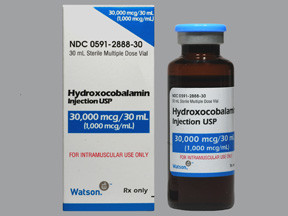HYDROXOCOBALAMIN - INJECTION
PHONETIC PRONUNCIATION: (hi-drox-oh-coe-BAL-ah-min)
GENERIC NAME(S): hydroxocobalamin
Uses
USES: Hydroxocobalamin is a man-made injectable form of vitamin B12 used to treat low levels (deficiency) of this vitamin. Vitamin B12 helps your body use fat and carbohydrates for energy and make new protein. It is also important for normal blood, cells, and nerves. Most people get enough vitamin B12 in their diet, but a deficiency may occur in certain health conditions (e.g., poor nutrition, stomach/intestinal problems, infection, cancer). Serious vitamin B12 deficiency may result in anemia, stomach problems, and nerve damage.
How to use HYDROXOCOBALAMIN - INJECTION
HOW TO USE: This medication is given by injection into a muscle as directed by your doctor. Dosage is based on your medical condition and response to treatment. Injections may be given daily when you first start treatment. Certain medical conditions (e.g., pernicious anemia) may require you to continue receiving injections every month. If you are giving this medication to yourself at home, learn all preparation and usage instructions from your health care professional. Before using, check this product visually for particles or discoloration. If either is present, do not use the liquid. Learn how to store and discard medical supplies safely.
Side Effects
Precautions
Interactions
Overdose
Images
Reviews
Faq for HYDROXOCOBALAMIN - INJECTION
Hydroxocobalamin injection is used to treat vitamin B12 deficiency and certain types of anemia.
Hydroxocobalamin is a form of vitamin B12 that helps the body produce red blood cells and maintain proper nerve function.
Hydroxocobalamin injection is given as an intramuscular injection, typically in the buttock.
Common side effects may include nausea, diarrhea, headache, dizziness, and injection site reactions.
The effects of hydroxocobalamin injection are usually seen within a few days to weeks of starting treatment.
Yes, hydroxocobalamin injection may interact with certain medications, including metformin, phenytoin, and certain antibiotics. It is important to inform your doctor about all medications you are taking before starting hydroxocobalamin injection.
The duration of treatment with hydroxocobalamin injection will depend on the underlying condition being treated. Your doctor will provide guidance on the duration of treatment.
Hydroxocobalamin injection is generally considered safe to use during pregnancy and breastfeeding. However, it is important to consult with your doctor before starting any new medications during pregnancy or while breastfeeding.
If you miss a dose, it is recommended to contact your healthcare provider to determine the best course of action.
Hydroxocobalamin is used to treat vitamin B12 deficiency, cyanide poisoning, and certain types of anemia.
Hydroxocobalamin is administered as an injection into a muscle or vein.
Common side effects of hydroxocobalamin include headache, nausea, vomiting, dizziness, and pain at the injection site.
The onset and duration of action of hydroxocobalamin depend on the condition being treated. It may take several weeks to see the full effects in cases of vitamin B12 deficiency.
Yes, hydroxocobalamin may interact with certain medications, such as potassium supplements, folic acid, and certain antibiotics. It is important to inform your healthcare provider about all the medications you are taking.
Hydroxocobalamin is generally considered safe to use during pregnancy and breastfeeding. However, you should consult with your doctor before using this medication.
The frequency of hydroxocobalamin injections will depend on the individual's condition and response to treatment. Your healthcare provider will determine the appropriate dosing schedule.
No, hydroxocobalamin is not available over-the-counter. It requires a prescription from a healthcare professional.
No, hydroxocobalamin and cyanocobalamin are different forms of vitamin B12. Hydroxocobalamin is considered to be the more stable and longer-lasting form.
Disclaimer
IMPORTANT: HOW TO USE THIS INFORMATION: This is a summary and does NOT have all possible information about this product. This information does not assure that this product is safe, effective, or appropriate for you. This information is not individual medical advice and does not substitute for the advice of your health care professional. Always ask your health care professional for complete information about this product and your specific health needs.

No Reviews Yet